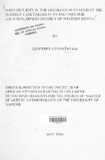| dc.contributor.author | Muga, Geoffrey O | |
| dc.date.accessioned | 2013-05-10T11:26:30Z | |
| dc.date.available | 2013-05-10T11:26:30Z | |
| dc.date.issued | 2007 | |
| dc.identifier.uri | http://erepository.uonbi.ac.ke:8080/xmlui/handle/123456789/21305 | |
| dc.description.abstract | This thesis focused on food security in the households headed by. elderly caretakers in
Nyang'oma sub-location, Bondo district of Western Kenya. The main objective was to
investigate the factors in the households headed by the elderly caretakers and how these
influenced household food security. The study examined household composition and its
influence on the division of labour for subsistence activities, socio-cultural and economic
factors influencing food security and the coping mechanisms adopted by the elderly
caretakers to counter the problems of food security in their households.
The study design was cross-sectional, combining both quantitative and qualitative
methods of data collection. Survey questionnaires were administered to 100 elderly
caretakers selected through snowball sampling strategy. Consent of the elderly caretakers
was sought before participation in the survey. Semi-structured interviews/
'..
narratives (10), key informants interviews (15) and focus group discussions (4) were also
conducted with the other categories of people in the-study population.
Data were analyzed using different techniques. Quantitative data were analyzed using
statistical package for social scientists (SPSS) version 11. On the other hand, qualitative
data were analyzed using content analysis method.
The findings suggested that over the last one and a half decades, the deteriorating
economic conditions and HIV/AIDS pandemic have led to the increase in the number of children in need of care and the unprecedented involvement of the elderly in the
caretaking responsibilities. The study pointed out that whereas the elderly were
increasingly assuming caretaker responsibilities, they were unable to guarantee food
security in their households due to a number of factors. The overriding factor was the
dwindling financial resources of the elderly which drastically reduced their ability to pay
for food, external labour and modem tools for food 'production. Dwindling extended
family support, lack of credit facilities to finance farm activities and the high rate of
unemployment among the youth further reduced the resource base and support which the
elderly could draw upon for food sufficiency in their households. Lack of physical energy
and ill-health which affected the ability of the elderly to produce food and indulge in
meaningful off-farm activities also worsened the situation. In addition, high dependency
ratio in the households meant that the few elderly with meager incomes were taking care
of more dependants and hence could not adequately provide for the competing basic
needs.
Despite these challenges, the study found out rthat as actors, the elderly caretakers
devised different mechanisms to cope with the food insecurities in their households .
. These included gathering economy, liquidation of assets and initiation of sedentary
micro-businesses. Although these mechanisms were aimed at relieving the households of
the acute food shortages, it is recommended that a long lasting solution would be found if
the Government's food security policy provided a framework of empowering the elderly
caretakers' households with credit.facilities for farm inputs and acquisition of farm labour
so as to boost food production | en |
| dc.description.sponsorship | The University of Nairobi | en |
| dc.language.iso | en | en |
| dc.subject | Food security in the households headed by the Elderly caretakers | en |
| dc.subject | Nyang'oma sub~Location, Bondo district of Western Kenya. | en |
| dc.title | Food security in the households headed by the Elderly caretakers in Nyang'oma sub Location, Bondo district of western Kenya. | en |
| dc.type | Thesis | en |
| local.publisher | Institute of anthropology, gender and African studies | en |

